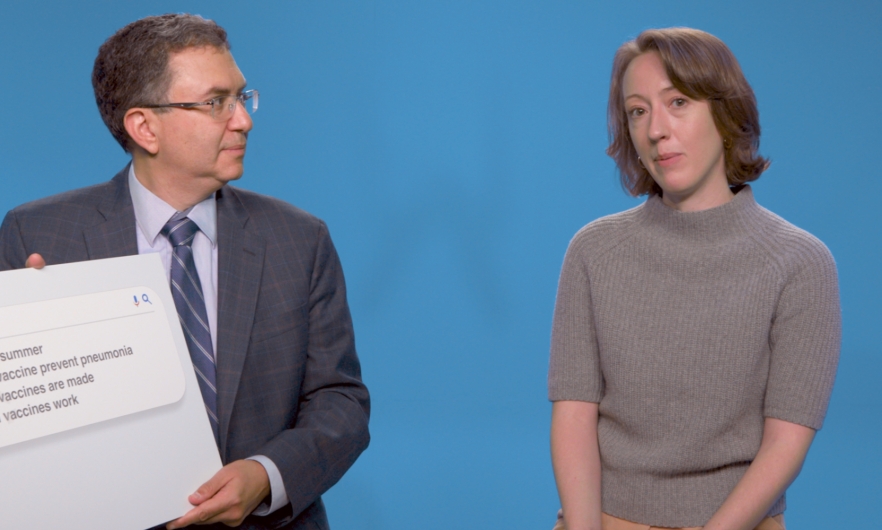Popular Google Searches About the Flu, Answered by Public Health Experts
Common questions about influenza and the annual flu vaccine get answers from experts in infectious diseases and public health policy.

Every fall and winter, Google searches rise with questions about the flu and flu vaccines. We collected some of the most popular flu-related searches and got trustworthy answers from two Bloomberg School experts.
Joshua Sharfstein, MD, is a professor of Health Policy and Management and vice dean for Public Health Practice and Community Engagement. Caitlin Rivers, PhD, MPH, senior scholar at the Johns Hopkins Center for Health Security and assistant professor in Environmental Health and Engineering.
Is flu a virus or bacterium?
Flu is a virus.
Is flu airborne?
CR: Flu can spread through the air, which means being near someone who has influenza can put you at risk.
JS: It also means wearing a mask can be helpful.
Learn more: How Flu Spreads
Is flu real?
CR: Yes, influenza is real. In the U.S., flu causes hundreds of thousands of hospitalizations each year and tens of thousands of deaths. It is real, it can be dangerous, and it is definitely worth protecting yourself against.
Learn more: Preventative Steps Against Flu
Is flu dangerous?
CR: It can be dangerous. This is particularly true for older adults, infants, and people who are pregnant. Particular groups are at greater risk for severe flu illness. Even for people who are young and healthy, who are unlikely to experience severe illness, flu is a really tough illness.
Learn more: People at Higher Risk for Flu Complications
Is flu the same as the Spanish flu?
CR: A little bit, yes. The seasonal influenza virus that we get vaccinated against every year is an influenza virus, as was the Spanish flu of 1918, but they are not exactly the same." Influenza is a virus that likes to change. Every year it's a little bit different, which is part of the reason you have to get vaccinated every year.
Is the flu vaccine free?
JS: It is free for a lot of people. There are requirements that vaccines be covered for many people with insurance so they don't have to do co-pays. And public health departments have the flu vaccine. So it's a good idea to check either with your insurer or with your health department to be able to get it for free.
Find a flu vaccine appointment or clinic near you
Is the flu vaccine a shot?
JS: Yes, the flu vaccine is a shot. Some people can receive the vaccine in nasal spray form; that's the live virus version. But the other version, the most common version, is an intramuscular shot.
Is it safe to get the flu vaccine during pregnancy?
JS: Yes, it is. The flu vaccine that's recommended during pregnancy is the inactivated one (injection), not the live virus vaccine (nasal spray).
CR: I have had two pregnancies and I was vaccinated for both of them. So that’s a personal attestation that it is safe and effective.
Learn more: Flu Vaccine Safety and Pregnancy
Is the flu vaccine near me?
JS: Today, at the end of October 2023, yes, vaccines are available all over the country and it is possible to find in your community.
Find a flu vaccine appointment or clinic near you
Does the flu vaccine prevent pneumonia?
CR: It can. The flu vaccine can reduce your chance of developing severe illness by about half, which is pretty impressive considering that the influenza virus can be pretty tricky to match up against. But we do a pretty good job. And so it can prevent pneumonia.
How are flu vaccines made?
CR: Most flu vaccines are made in eggs, which is why there are sometimes questions about whether people who have egg allergies are able to receive the flu vaccine. There are other ways to make flu vaccines. The egg-based approach is not the only manufacturing approach, but I believe it's most common.
Learn more: How Influenza (Flu) Vaccines Are Made
Is the flu vaccine safe for people with an egg allergy?
JS: Yes.* If people with egg allergies have concerns, it's always good to talk to their doctor about getting vaccinated. But in general, it is a very safe vaccine. If people have had an allergic reaction to a flu vaccine, that's where you really have to be especially cautious.
Read more: Flu Vaccine and People with Egg Allergies
How does the flu vaccine work?
CR: Flu vaccines work by giving your body a little peek at the proteins, or the composition of the virus, and stimulate your body to make defenses against that recipe, if you will. That way, when you encounter the influenza virus in the wild, your body is already revved up and familiar and is able to really combat that virus.
JS: If you're not vaccinated, just like for COVID or something else, your body has to take the full weight of that initial infection while it's starting to respond. If you're vaccinated, you can respond right away. It's sort of like you have the bouncers already ready for the virus.
Can you get the flu from a flu shot?
JS: No, you cannot get the flu from a flu shot. And that is because flu shots don't actually contain live flu virus.
CR: Sometimes when you get a vaccine, whether flu or really any vaccine, you can feel crummy for a couple of hours, maybe a day. And that's your immune system doing its job and ramping up. But it is different than having an active infection. So if you have some aches or a little fever after a vaccine, that's normal and it will pass.
JS: There is a misconception of “if I can get sick after a vaccine, then what's the point of getting a vaccine?” But vaccines prevent the severe complications. People are getting that flu shot in order to not get a severe case of pneumonia or go into the hospital or even die. And that's not going to happen from a flu shot.
Can you get the flu after being vaccinated?
JS: Yes, it is possible. And in part that's because the vaccine isn't perfectly matched up with the virus. The viruses are constantly changing, and vaccines don't fully prevent infection against flu. But the good news is you're less likely to be hospitalized or get really sick. So you're not really getting a flu vaccine to be perfectly healthy and never worry about the flu—you're getting a vaccine to be able to keep doing the things you enjoy.
When is flu season?
JS: The typical flu season is at the end of the year and the beginning of the next year. November, December, January, February; it can vary a bit. Some health departments also track how prevalent flu is in their area based on doctor and emergency room visits and positive flu tests. If you hunt around on your health department's website, you may find a curve that shows you where your community is in terms of flu season.
Follow CDC guidance and updates for this year’s flu season
Why do people get the flu in the summer?
CR: Seasonal influenza circulates most often in winter. December and January are usually the peak months, but it's possible to get flu in summer, particularly flu B, which is one of the types of influenza that is more common in summer. But generally, activity is much lower in the summer.
When is the best time to get a flu vaccine?
JS: For most people, the best time is just at the beginning of flu season or a little bit before. October would be my preferred month.
CR: I heard “flu before boo” recently, as in, you should get your flu shot before Halloween.
When is the flu shot available?
JS: They usually become available in the late summer or early fall.
Find a flu vaccine appointment or clinic near you
*A serious reaction is unlikely to occur, but if you have had a severe reaction in the past or are concerned about an egg allergy, please check with a health care provider. There are flu shot formulations made without eggs that may be recommended to you. For more information, visit the CDC's article, Flu Vaccine and People with Egg Allergies.





